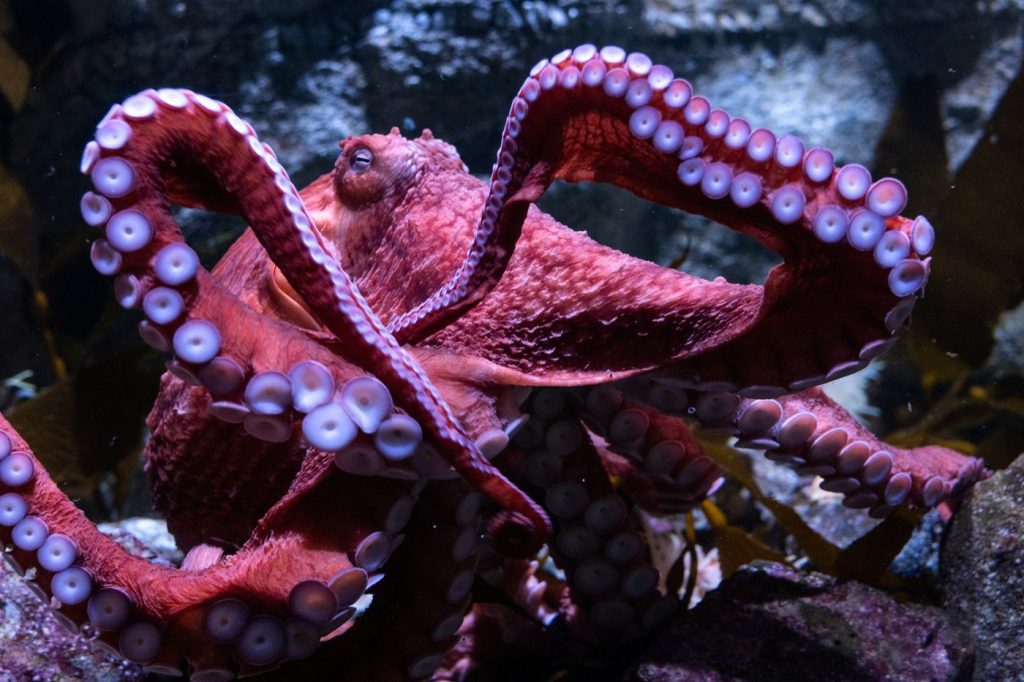LOS ANGELES (AP) – A beloved giant Pacific octopus named Ghost, residing in the Aquarium of the Pacific in Long Beach, California, has recently entered her senescence phase, during which she is focusing her final energy on caring for her eggs. Despite her efforts, these eggs are unfertilized and will never hatch. The touching story of Ghost has drawn a wave of support and affection from the public, with many reminiscing about their visits to the aquarium and sharing their memories on social media.
Ghost, who weighed just 3 pounds (1.4 kilograms) when she arrived from British Columbia, Canada, in May 2024, now weighs more than 50 pounds (22.7 kilograms). The average lifespan of a giant Pacific octopus ranges from three to five years, placing Ghost’s current age, estimated to be between two and four years, well within this range. During her time at the aquarium, she distinguished herself as a remarkably active and social animal, engaging joyfully with both staff and visitors.
Throughout her life, Ghost formed a special bond with her caregivers. The aquarium’s vice president of animal care, Nate Jaros, described her as “super active and very physical,” noting that she often showed preference for playing with her caregivers over eating. Ghost was trained to enter a basket voluntarily for weighing and monitoring her diet, exemplifying her intelligence and curiosity—traits characteristic of octopuses, which are known for their charisma.
During this final phase, Ghost has entered a period where she is neglecting her own needs, including feeding, to protect and aerate her eggs. The instinct to care for her eggs, even when they will not develop into hatchlings, highlights the unique life cycle of the giant Pacific octopus. In the wild, these octopuses lead solitary lives, only coming together for reproduction. Jaros explained the dynamics of male and female interactions in the wild, emphasizing the risks associated with cohabitation due to the potential for aggression.
Meanwhile, the aquarium staff continues to provide Ghost with enrichment activities designed to stimulate her natural hunting instincts. They regularly hide food inside toys and puzzles, allowing her to exhibit her intelligence and problem-solving skills. A particularly notable event involved creating an elaborate acrylic maze for Ghost, which she successfully navigated almost instantly, showcasing her quick learning ability.
As Ghost spends her remaining days in a private tank, the aquarium has already welcomed a new octopus to help educate the public. This newcomer, weighing 2 pounds (900 grams), will be named after staff members assess its personality; it has already been described as “super curious” and “very outgoing.” This new addition aims to continue Ghost's legacy and further engage visitors in learning about octopuses and marine life.
The impact Ghost has had on visitors and staff is palpable. Marine biology student Jay McMahon, who visited the aquarium recently, reflected on the connection he formed with Ghost and how it inspired him to pursue a career in marine biology after an early visit to the aquarium at the age of four. McMahon expressed the significance of these moments, especially knowing the limited lifespan of such intelligent creatures, and hopes that Ghost's story inspires others to deepen their understanding of octopuses and their crucial role in marine ecosystems.
In conclusion, Ghost's journey has not only captivated the hearts of many individuals but also emphasizes the importance of marine education and conservation. As Ghost receives love and care in her final days, she leaves behind a legacy that will inspire future generations to appreciate and protect the wonders of marine life.











